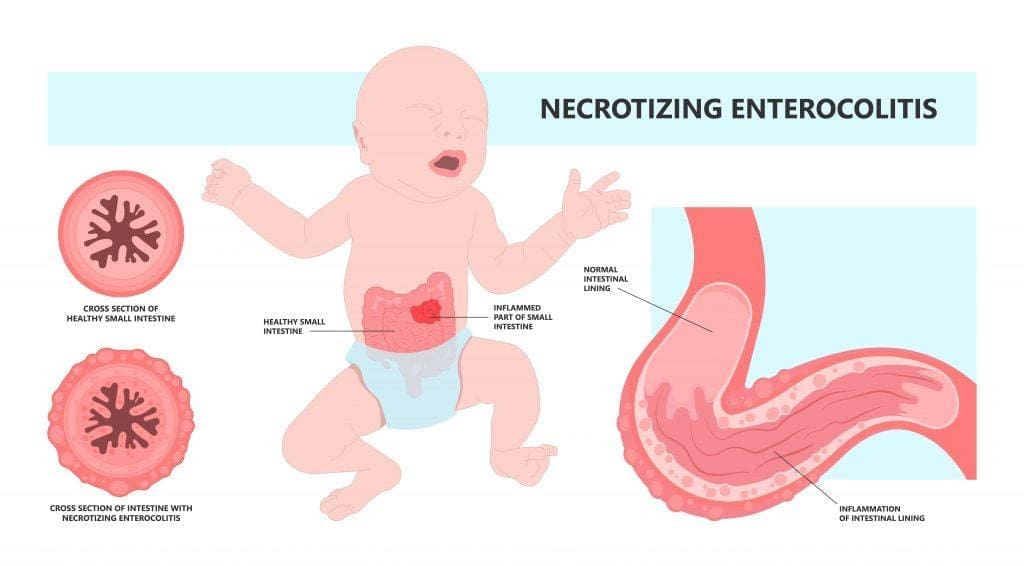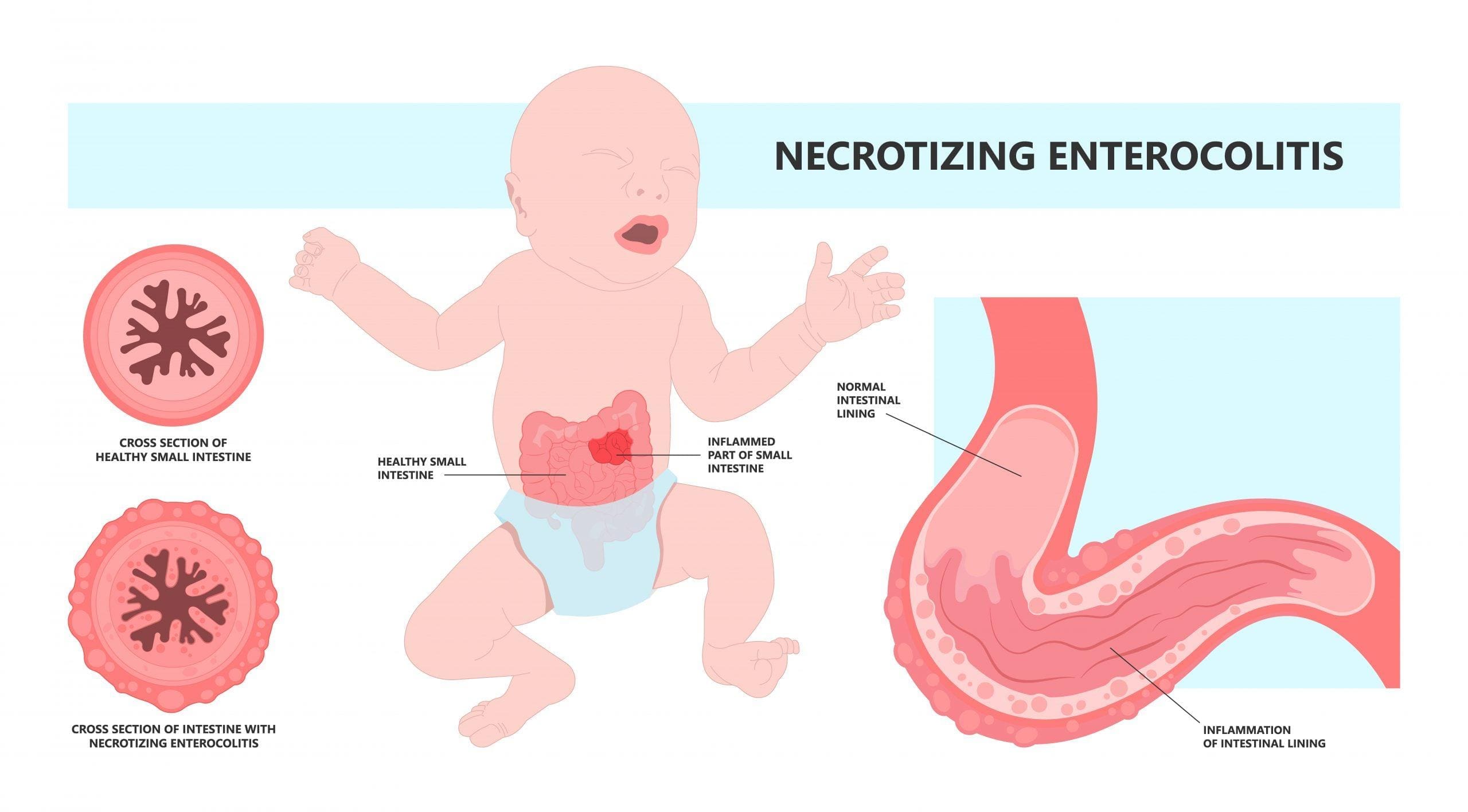Posted by : ZeroRisk Cases Marketing
NEC is a potentially fatal condition mainly afflicting premature infants. Parents are filing lawsuits because milk-based formula can cause NEC. Formula manufacturers should’ve warned doctors and parents of the risks. Without that warning, they couldn’t make an informed decision about whether to use the formula or not.
What is NEC?
NEC is a severe gastrointestinal condition primarily affecting premature babies. It inflames intestinal tissue, causing it to die. A hole may form in the infant’s intestines so bacteria leaks into the abdomen or bloodstream. NEC usually develops when the infant, often born prematurely, is two to six weeks old.
The condition may be mild, and the infant may recover. It can also be severe and life-threatening. NEC may wholly or partially destroy an infant’s bowel, leading to death or lifelong disabilities.
The National Institute of Child Health and Development estimates about 9,000 infants born in the US each year suffer from NEC, about 7% of very low birth weight infants. NEC is one of the leading causes of illness and death among preterm infants. The condition is fatal for fifteen to forty percent of infants with NEC.
The Cleveland Clinic estimates two in ten infants with NEC will not survive. Some of those who do will have long-term health problems due to NEC.

What are Similac and Enfamil’s Uses?
Both Similac and Enfamil have formulas for premature infants. They’re meant to provide nutrition so the infant can grow and thrive. The formulas are used by hospitals caring for premature infants and by parents when they get home.
How are Infants Exposed to Similac and Enfamil?
Similac is made and sold by Abbott Laboratories. Enfamil is manufactured and sold by Mead Johnson. Both companies market the products to hospitals, doctors, and parents.
What are NEC Risks and Warnings?
Unicef reports that studies published from 1990 to 2020 found:
- Intake of mother’s milk in the first ten days of life is associated with lower rates of NEC and less risk of death in the first eight weeks of life when newborns’ birth weight is fewer than two kilograms. “It is therefore highly recommended to encourage human milk intake for all newborns.”
- Extremely low birth weight infants not predominantly fed human milk have an increased risk of NEC. Researchers concluded providing mothers milk “may prevent infant deaths and reduce costs.”
- Infants exclusively fed formula or a mixed diet had a higher risk of developing NEC than breastfed infants.
- In a study involving 926 preterm infants, 51 developed NEC. Exclusively formula-fed infants were six to ten times more likely to develop NEC than those fed breastmilk. NEC is rare in infants born after more than 30 weeks of gestation, but it was 20 times more common if the infant received just formula
These are just a few studies emphasizing infants fed mother’s milk are generally healthier, and those fed formula can suffer health conditions as a result.
What’s the Status of NEC Lawsuits?
Many parents filed medical malpractice claims after their infants suffered NEC. Physicians often claimed they didn’t warn parents of potential problems because they weren’t aware of the risk. Those supplying formula for premature infants didn’t warn them of the chances of NEC development. Formula manufacturers then became subject to more lawsuits.
There are no pending federal class-action lawsuits, and a multi-district litigation order hasn’t been issued. Many NEC-related lawsuits are filed in Illinois state courts because Abbott Laboratories and Mead Johnson are based in Chicago. There are relatively few NEC cases compared to other mass tort litigation, but the number is growing.
What is NEC?
- Necrotizing enterocolitis is a severe gastrointestinal condition mainly affecting premature babies
- NEC is one of the top causes of illness and death for preterm infants
- It inflames and kills intestinal tissue
- About 9,000 infants in the US annually develop NEC
- 15% to 40% of them die of the condition
What causes NEC?
- Feeding premature infants milk-based formula such as Enfamil and Similac increases the risk of NEC
- Premature infants exclusively fed formula are six to ten times more likely to develop NEC than those receiving breastmilk
Who are the Country’s Biggest Formula Suppliers?
- Similac is made and sold by Abbott Laboratories
- Enfamil is manufactured and sold by Mead Johnson
- Both market formula for premature infants to hospitals, doctors, and parents
What’s the Status of NEC Lawsuits?
- There are currently no federal class actions or multi-district litigation orders
- Many lawsuits are in Illinois state courts, where Abbott Laboratories and Mead Johnson are based
Ed Lott, Ph.D., M.B.A.
President and Managing Partner
ZeroRisk Cases®
Call 833-ZERORISK (833-937-6747) ext 5


Recent Posts
- Valsartan Lawsuits Update 2024
- PFAS Litigation Update September 2024
- Latest Developments In Zantac Lawsuit
- EPA Cracks Down On Polyfluoroalkyl Substances PFAS
Categories
- Camp Lejeune
- Client Acquistion
- Client Financing
- Company Business
- Daily Dose of Law
- Digital Display Advertising
- Google Maps Ranking
- Human Trafficking
- Law Firm Info
- Lead Generation
- Litigation Funding
- Mass Tort News
- Mass Tort Signed Cases
- Personal Injury Leads
- Sex Abuse Cases
Archives
- September 2024
- July 2024
- June 2024
- May 2024
- April 2024
- February 2024
- January 2024
- December 2023
- November 2023
- October 2023
- September 2023
- August 2023
- July 2023
- January 2023
- December 2022
- November 2022
- October 2022
- September 2022
- August 2022
- June 2022
- May 2022
- April 2022
- March 2022
- February 2022
- January 2022
- December 2021
- November 2021
- October 2021